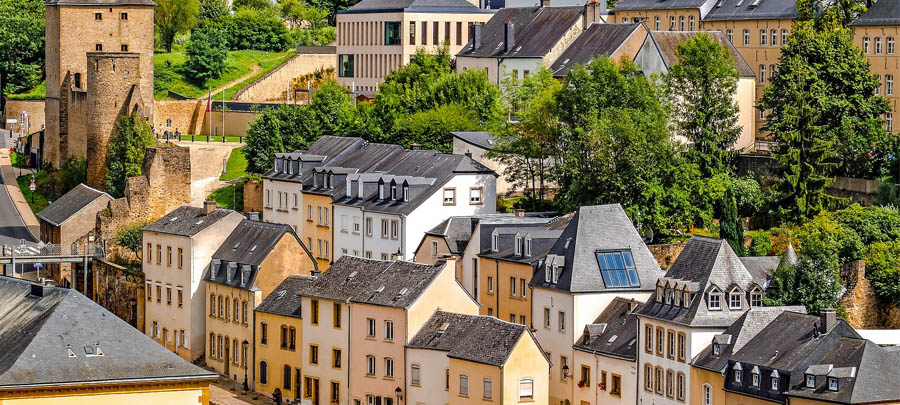Positioned at the heart of Europe, Luxembourg represents an exceptional entry point to the Blue Banana European corridor, a market of millions of affluent consumers and an area in which goods, people, and money flow freely. Besides political and social maturity, this country has an excellent public infrastructure, a safe environment, and high standards of living, making it a great option for food producers from around the world looking for European food importers.
Business Climate
The “Green Heart of Europe”, continues to demonstrate one of the most pro-business climates in the EU (4th). According to the 32nd annual competitiveness report, the Grand Duchy is the 15th most competitive country in the world and far outstrips its direct competitors Germany (17th), Belgium (25th), and France (32st).
The highly educated workforce is trilingual due to a fusion of Romanic and Germanic influences – with Luxembourgish, French, and German as official languages -, an asset that encourages business or international affairs.
Moreover, the Grand Duchy has been a tax haven of choice for corporations since the 1960s. Compared to taxation in other European countries, the standard VAT rate is 15%.
A Taste for Global Food
The international ambiance stems from Luxembourg as a home to many cultures. Despite its small size, people from over 170 different nationalities account for nearly half of its population. As a result, the country is packed with specialty food importers, distributors and stores supplying home-baked, fresh, and store-cupboard produce for every taste.
Eating and drinking are specific aspects of Luxembourgs culture, the capital having most Michelin restaurants per capita in the world. Luxembourgish cuisine stands out due to its powerful connection with home-regional produce, of potatoes, fruit & vegetables, meat & fish from the country’s fields, forests, and rivers, which served the population for centuries.
Food Production and Trade
Luxembourg is a dynamic agri-food industry in terms of diversity and quality of products. Besides cereal crops, many different local products are manufactured in Luxembourg such as grapes, barley, oats, potatoes, wheat, beer, water, chocolate, cookies, fish, fruits, dairy, and meat (beef, chicken, and processed meat). The food self-supply ratio of Luxembourg shows that Grand Duchy generates 114% of its beef demands, 99% of milk, 67% of pork, but only 35% of eggs, 3-5 % of vegetables, 1.4 % of chicken, and < 1% of fruit.
For the past decade, Luxembourg fell into a trade shortage due to its dependence on significant food imports in the small agricultural sector. As a small country that goes well with shorter supply chains, the trend stays with wholesalers, retailers, and restaurants that buy local produce with ethical and ecological added value.
In terms of trading activities, Luxembourg is very reliant on its EU member states. The three main suppliers of commercial exchanges are Belgium (25.5%), Germany (23.3%), and France (12.5%), other notable partners being the Netherlands, as well as China, and the United States. As Luxembourg is striving to expand its exports outside the European Union, the country has essential trade connections with Asian and Middle Eastern nations.
Rising Interest in Organic Food
Luxembourg’s organic market has grown steadily by 5-10% per year, for a number of years. Local consumers are undoubtedly interested in organic food, although at least 80% of the organic products are imported. Premium quality and sustainable food availability may lead to a trend in which consumers choose the local taste. With one of the highest per capita consumption rates for organic products in the world, Luxembourg`s small but well-developed market warrants consideration.
Online Food Sale
After staggering for the past two decades, the implementation of online retail in Food & Beverages has finally become the fastest-growing product category in eCommerce. This market covers the sale of fruit, vegetables, pasta, snacks, sweets, refrigerated products, fresh and packaged foods, frozen food, delicacies, beverages, and alcoholic drinks. The most significant channels are the online shops of the large supermarkets and warehouse stores and only well established offline retailers can compete.
Entering the Luxembourg Market
International investors can initiate businesses in the agriculture industry which is a less explored economic sector but with many branches. As a nation profoundly reliant on export, Luxembourg is home to businesses that are open to international companies and the route to market will be more fluid with a local partner. Luxembourg holds huge potential for high-end retailers looking to enter a new market. Due to its small size and its unique multi-cultural community, Luxembourg is a promising place for experimentation with sustainable innovations, both local or international.
3 Food Importers from Luxembourg :
- Biogros
Address:13, Rue Gabriel Lippmann, Parc D’activité Syrdall, Munsbach
Phone: 00352261519200
Website: www.biogros.lu - Grosbusch
Address: 10-11 Zone D’activités Economiques Le Triangle Vert, Ellange
Phone: 00352 403 703
Website: www.grosbusch.lu - Au Gourmet Grec
Address: 87, Rue De Bonnevoie, Luxembourg
Phone: 0035226481177
Website: www.augourmetgrec.com
To get access to a list of more active food importers from Luxembourg, you can access one of the BestFoodImporters databases.
